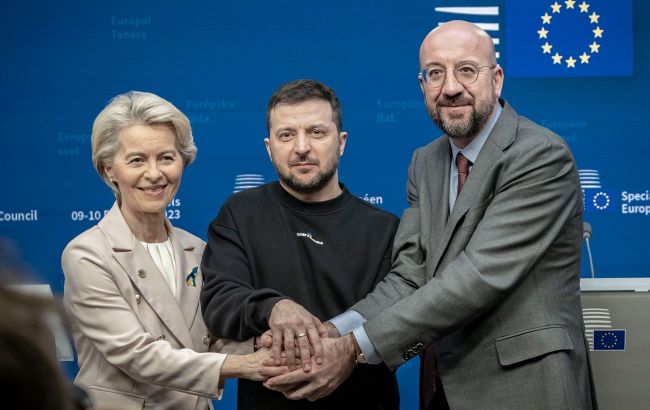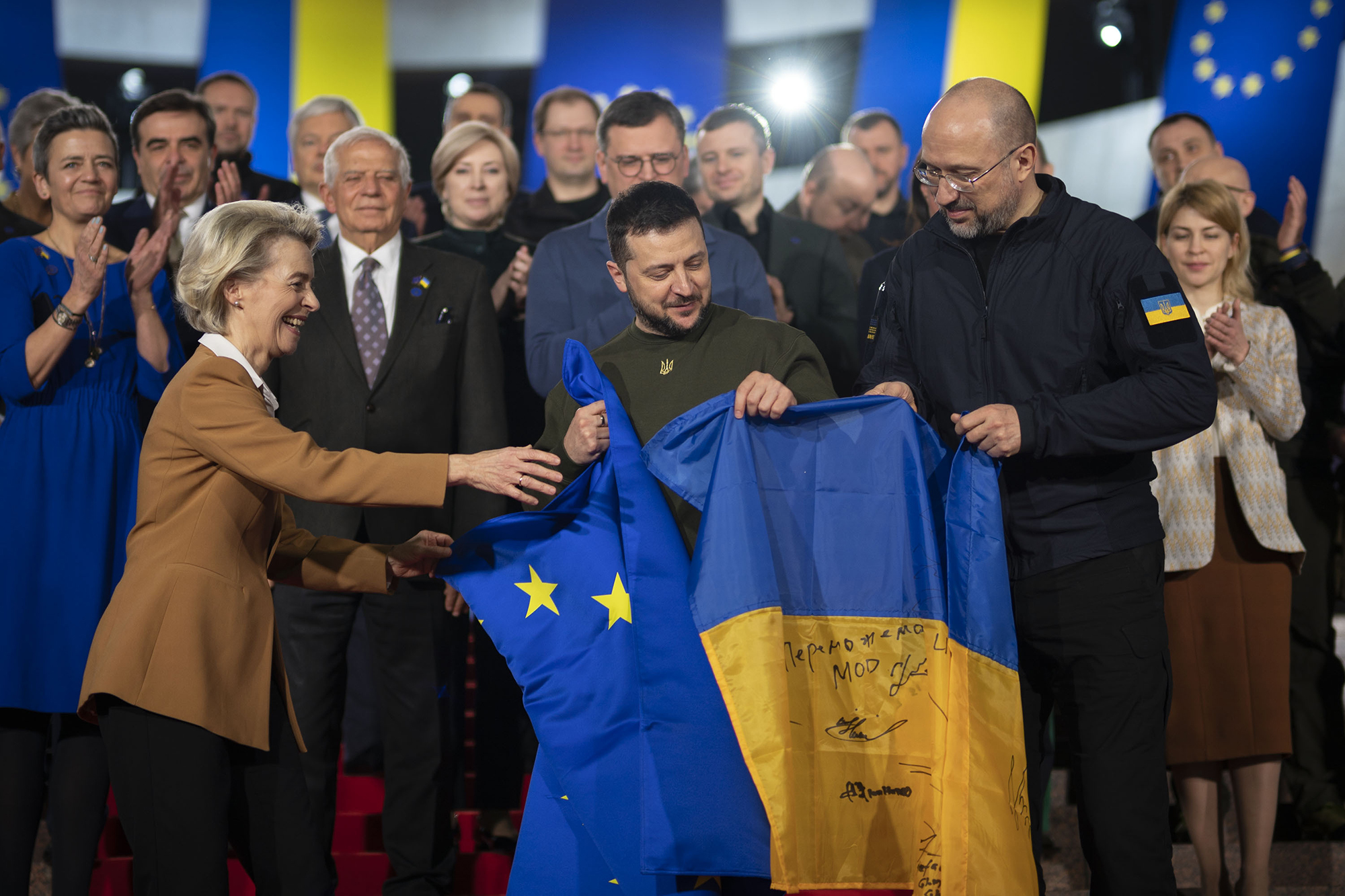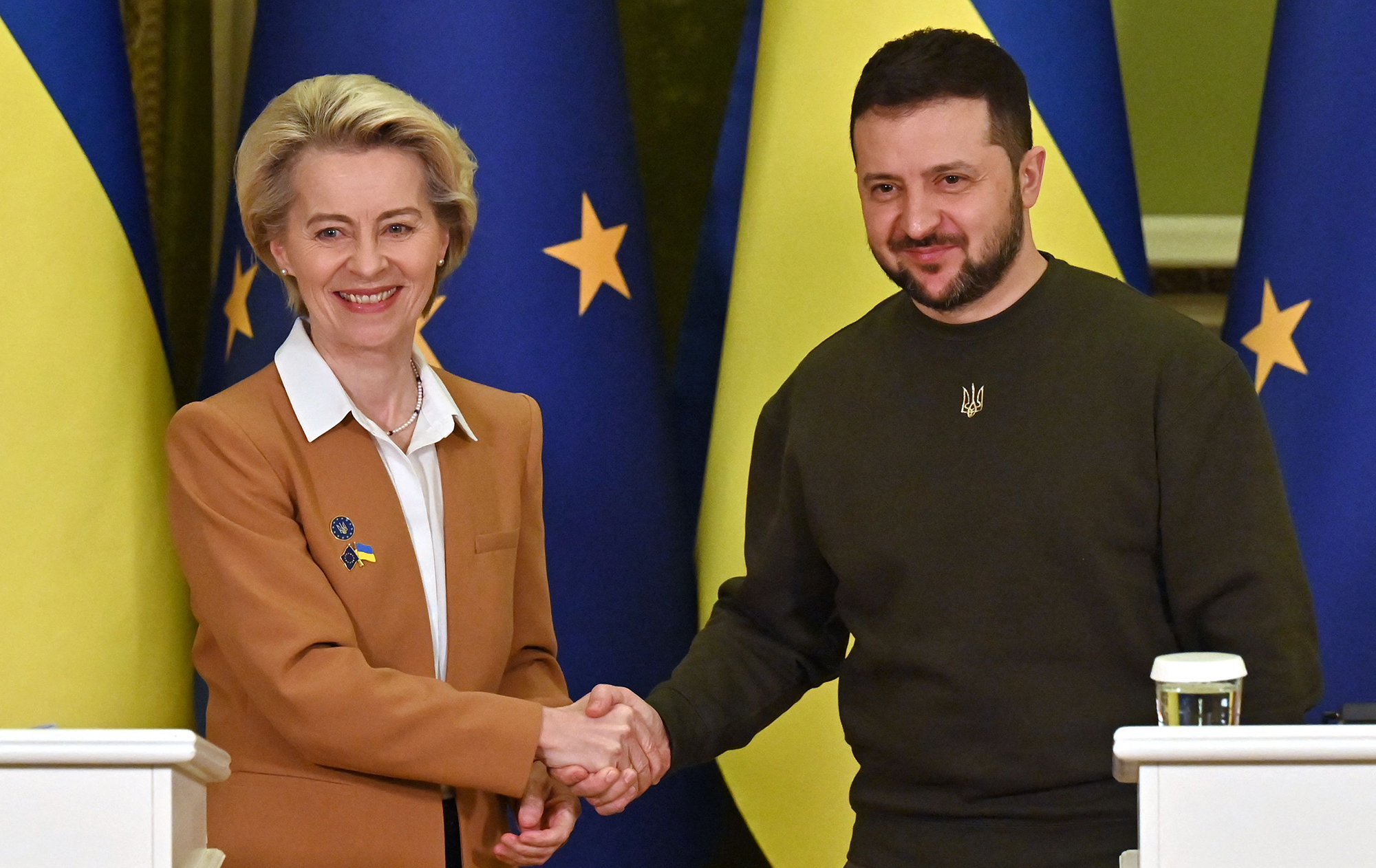Possibility of Brussels providing Ukraine with €50 bln and when EU accession talks to begin: Analysis
 Volodymyr Zelenskyy, Charles Michel and Ursula von der Leyen (photo: Getty Images)
Volodymyr Zelenskyy, Charles Michel and Ursula von der Leyen (photo: Getty Images)
A historic summit of the European Council will begin in Brussels today. EU leaders will gather to decide whether to start accession talks with Ukraine. How Ukraine has been preparing for this day, what the obstacles were, and whether the summit will make a positive decision, read in the RBC-Ukraine article.
The material is prepared based on statements of Ukrainian, Hungarian, and European officials, reports of the European Commission, and exclusive comments of the Deputy Prime Minister for European Integration Olha Stefanishyna, and Leo Litra, Senior Analyst at the New Europe Center.
The current summit in Brussels will be historic in any case. Either Ukraine will hear 27 long-awaited "Yes" votes to start negotiations on EU membership, or the summit will turn into a historic "betrayal" by blocking Ukraine's European integration.
The second scenario still cannot be ruled out, as Hungary, at least publicly, has not yet changed its negative stance on the Ukrainian issue. Austria made an unexpected maneuver a few days before the summit, opposing the start of accession talks with Ukraine. Austrian Chancellor Karl Nehammer explained his position by saying that "there should be no preferences for Ukraine compared to Bosnia and Herzegovina," which is also currently applying for EU membership.
In addition to the negotiations, European leaders will also consider the issue of providing Ukraine with 50 billion euros as part of a four-year assistance program. But there is no consensus in the EU on this issue yet, also because of Hungary.
From Euromaidan to the present day
Ukraine has come a long and thorny way to this summit. This path began back in 1993 when the Verkhovna Rada enshrined Ukraine's intention to build cooperation with the EU in a resolution. From 2007 to 2013, Kyiv and Brussels negotiated the EU-Ukraine Association Agreement.
The signing of the agreement, as you know, was disrupted in November 2014 by then-President Viktor Yanukovych. Yanukovych's refusal provoked the Euromaidan protests, which grew into the Revolution of Dignity and ended with his flight to Russia's Rostov.
 In 2013, Ukrainians came out to Euromaidan because they wanted to be in the EU (photo: Vitaliy Nosach, RBC-Ukraine)
In 2013, Ukrainians came out to Euromaidan because they wanted to be in the EU (photo: Vitaliy Nosach, RBC-Ukraine)
In March-June 2014, the Association Agreement was signed by the new Ukrainian government. Three years later, the agreement entered into full force. At the same time, Ukrainians received the long-awaited visa-free travel with the EU. Although visa liberalization is not formally tied to the country's integration into the European Union, it is clear that for many Ukrainians, visa-free travel has become one of the most tangible bonuses on Ukraine's overall path to Europe.
However, Ukraine's European integration processes slowed down, and the EU did not even want to talk about Ukraine's membership. For example, in 2021, the then-president of Estonia (one of Ukraine's biggest friends in the European Union) Kersti Kaljulaid said that Ukraine still needed about 20 years to become an EU member. But the full-scale invasion of Russia made its adjustments.
On the fifth day of the war, February 28, 2022, when columns of Russian troops were trying to break through to Kyiv, President Volodymyr Zelenskyy, together with the heads of government and parliament, signed Ukraine's application for EU membership, demanding that it be considered as quickly as possible under a "special procedure" given the extreme circumstances in which the country found itself.
As early as June 2022, Ukraine became a candidate for EU membership, officially launching the process of becoming a full member. Along with the candidate status, Ukraine received seven recommendations from the European Commission that had to be implemented to move on to membership negotiations.
The Ukrainian authorities had to complete the reform of the judiciary and the Constitutional Court, appoint new heads of the National Anti-Corruption Bureau of Ukraine (NABU) and Specialized Anti-corruption Prosecution (SAP), fight money laundering, implement laws on media, and national minorities, and fight the influence of oligarchs. The last item was later removed from the agenda on the initiative of the EU itself. Instead, Ukraine is to adopt a law on lobbying.
After assessing the implementation of the "homework" in early November, the European Commission recommended that EU leaders approve the start of accession negotiations with Ukraine. However, Kyiv had to complete several more reforms before the EU summit, including strengthening the independence of the SAPO and approving legislation on national minorities. The Ukrainian side has also coped with these tasks. So now the decision is up to the EU leaders.
What to expect from the summit in Brussels
Despite the Austrian chancellor's recent statement, Hungary is the main opponent of starting negotiations with Ukraine. Budapest keeps giving new reasons why the EU should not make such a decision. The Hungarian government is afraid that Ukraine will "bring war to the EU," is concerned about the rights of its minority in Zakarpattia, accuses Ukraine of not meeting the requirements for membership, or even cites Ukrainian corruption as an argument.
Once the Ukrainian Parliament adopts the law on national minorities, it will be difficult for Budapest to use this issue to block negotiations, as the document meets European standards. Moreover, representatives of the Hungarian community in Zakarpattia, whose rights are so stubbornly defended by the Hungarian authorities, called on Orban to make a positive decision on Ukraine at the European Summit. He sent them a response with a promise to "protect the rights of the Hungarian community."
 Hungary threatens to block the decision to negotiate with Ukraine (photo: Getty Images)
Hungary threatens to block the decision to negotiate with Ukraine (photo: Getty Images)
On the eve of the Brussels summit, EU leaders tried to convince the Hungarian prime minister to change his position. French President Emanuel Macron met with Orban in Paris, the leaders of Spain and Germany spoke with him on the phone, and European Council President Charles Michel interrupted his visit to China for the sake of the Hungarian prime minister. However, after each negotiation, Orban publicly insisted that Hungary was against the start of negotiations.
Representatives of Ukraine also spoke with Budapest. Deputy Prime Minister for European Integration Olha Stefanishyna, Head of the Presidential Office Andriy Yermak, and Foreign Minister Dmytro Kuleba spoke with Hungarian Foreign Minister Peter Szijjarto. And Zelenskyy spoke briefly with Orban at the inauguration of Argentina's new president, Javier Milei, asking him to name at least one reason why Ukraine should not be in the EU.
"Ukraine sees no objective reasons for blocking the decision to open accession negotiations. At the same time, there is an understanding that the agenda of the European Council meeting includes a wide range of issues, and Hungary's position is determined not only by Ukraine. Today, there are opportunities for dialogue and finding a solution to initiate negotiations," Stefanishyna told RBC-Ukraine.
While Budapest publicly demonstrates that its position has not wavered, unofficially Kyiv receives positive signals from the Hungarian side. As Minister Kuleba recently told a telethon, Ukraine recently received the first non-public and unofficial signal from Hungary about a "window of opportunity" at the EU summit.
If Hungary does block the start of negotiations with Ukraine, it will be a failure of the entire EU, and the results will affect the credibility of the enlargement process. In addition to Ukraine, Moldova is also waiting for a decision to start negotiations, but it is unlikely that Chisinau will get the green light before Kyiv, according to Stefanishyna.
"At this stage, I can say that every EU member state understands that no decision to start accession talks with other candidate countries can be made without a corresponding decision on Ukraine," Stefanishyna told RBC-Ukraine in October.
 Ukraine and EU leaders tried to convince Orban to change his position (photo: Getty Images)
Ukraine and EU leaders tried to convince Orban to change his position (photo: Getty Images)
The recent statements by the Austrian side could also cause concern among Ukrainians, but as the Deputy Prime Minister explained the other day, Vienna's position was expected. According to her, Austria has been a powerful advocate of EU enlargement to the Western Balkans for many years, which is why it is lobbying for Bosnia and Herzegovina today. But Vienna is also ready to support Ukraine's European integration.
"At a meeting with the European Affairs Ministers, my Austrian colleague confirmed that they would support the decision to start negotiations but demand a broader solution for all enlargement countries. This is a moderate position that is in Austria's interests. But I emphasize that Ukraine has not used and will not use any personal discounts in this process," she said.
However, as mentioned earlier, the accession negotiations are not the only important issue for Ukraine to be discussed at the European summit. Equally important will be the search for consensus on the 50 billion euros for Ukraine. As Stefanishyna explained in a commentary to RBC-Ukraine, the approval of these 50 billion is a matter of economic stability and survival of Ukraine. And according to the Deputy Prime Minister, there is a full understanding among the EU member states.
"At the same time, the corresponding assistance is part of the overall budget framework of the European Union, and there are certain discussions about budgetary matters. However, among partners, there is a clear understanding that support for Ukraine must continue," she told RBC-Ukraine.
In addition, as Stefanishyna told journalists in Brussels earlier, this issue would have a direct impact on the decision to assist Ukraine from the United States. And now, according to her, there are no guarantees that in case of failure at the summit, these funds will be provided to Ukraine in one form or another. That is, Ukrainians may be left without important support to further deter Russian aggression.
Hungary has taken these two issues hostage to achieve its own goals. In particular, Budapest wants to unblock EU funds that have been frozen due to Orban's domestic policy, as the Hungarian government has explicitly stated.
 At the moment, it is impossible to predict the outcome of the EU summit (photo: Getty Images)
At the moment, it is impossible to predict the outcome of the EU summit (photo: Getty Images)
For example, recently, the political director of Hungarian Prime Minister Balázs Orban told Bloomberg that Budapest was ready to approve the allocation of €50 billion to Ukraine if the EU unfreezes €30 billion for Hungary. At the same time, Hungary is proposing that the EU abandon the four-year support package for Ukraine and approve funding only for the next year.
"Financing Hungary and financing Ukraine are two separate issues. But if the EU insists that funding for Ukraine should come from the amended EU budget, then these two problems become linked," said Balázs Orban.
And in this matter, the European Commission did meet Hungary halfway. Yesterday, the EC decided to unfreeze 10 billion euros, i.e. a third of the total amount. More than 20 billion euros will remain blocked for now. However, it is unclear whether this concession will satisfy Hungary's appetite.
Of course, the EU can bypass the Hungarian blockade (there is a special mechanism for this) and make the necessary decisions without Budapest, but this will significantly undermine unity within the bloc. Therefore, it is unlikely that EU leaders will take such a step; rather, they will try to find a compromise with Orban.
 Zelenskyy says Ukraine has no plan B (photo: Getty Images)
Zelenskyy says Ukraine has no plan B (photo: Getty Images)
In an interview with RBC-Ukraine, Leo Litra, a senior analyst at the New Europe Center, estimated the chances of opening membership talks at the Brussels summit at 50-50. According to him, Orban is bargaining hard with the EU, so he will bend his line to the last.
"I think there is still a chance. But if it doesn't happen, it's not a disaster. If this does not happen, it will be a very bad signal, but it is not a disaster. It will be a catastrophe if the €50 billion program is not adopted, because it is very important now. We need this money for yesterday," the analyst explained.
According to Litra, the approval of a financing program for Ukraine at the summit without a decision to open negotiations could be a kind of plan B. In this scenario, the issue of introductory talks could be postponed until next March. "I think such a compromise would be worthy for Ukraine," Litra said.
The EU itself is optimistic about the decision on 50 billion euros for Ukraine. European Budget Commissioner Johannes Hahn suggested yesterday that this issue would be approved at the summit, as the allocation of aid to Ukraine from the revised EU budget could bring bonuses to Hungary as well.
"This is a package, it is not only for Ukraine, it has something for migration, border protection, support for countries like Turkey, which are good friends of Hungary today," Hahn explained.
So the EU summit begins without any specifics for Ukraine, and its outcome is difficult to predict. The EU leaders will decide Ukraine's fate on the sidelines of the meeting in Brussels, but Kyiv, as Kuleba said, is playing out the most creative solutions and the most stunning combinations at all levels to ensure that the necessary decisions are made.
"Ukraine has no plan B in case the Brussels summit fails," Zelenskyy told reporters yesterday. Ukraine's only plan is to be in the EU, and if there is no positive decision at the summit, it means that Putin has vetoed this decision, the President concluded.

